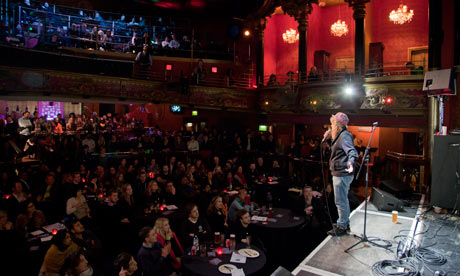
Getoverit99 writes:
Everything Speaks in its Own Way is a book of poems and songs straight from the heart of Kate Tempest, who is living for her art. They are so full of
emotion that they cannot fail to bring out emotion in the reader. Her style is a mix of classic word play and modern street slang and it works really well.
There are strong comments on today's society, beautiful messages to former friends, a number of poems on the subject of love and men as Kate covers a broad range of subjects.
Kate appears to be battling certain demons and is retrospective but always very positive for the future. The fact that she is so honest and real, but looking to improve makes her very likeable.
Whilst the raw, personal poems are great, I would like to have read a few more captures in time like "Eating a Plum in a Carpark in Reno", or created
situations that were less real. As when this happens it is a pleasure to be taken away to these places. I thought it didn't feel like a complete, rounded book. This may be due to Kate having many strings to her bow, but it seems more of a gathering of
material.
Faye Lipson writes:
Speaking at the recent Lyric Festival of poetry, veteran poet Linton Kwesi Johnson drew ecstatic cheers from his audience when he said that the critical page poetry/performance poetry distinction was the result of "critics trying to make work for themselves".
As a poet and critic myself (and a member of the cheering audience that day), I agree with Johnson. The popularity of his words reflected a certain suspicion towards the page/stage dichotomy, which is increasingly being viewed as artificial. Do poets really belong in factions? Aren't there just poets, and … well, more poets?
Seeming to answer the question is Kate Tempest, with a multimedia take on the traditional poetry book. Everything Speaks In Its Own Way, released on Tempest's own publishing imprint Zingaro Books, is not a slim volume of verse. Its end pages double as sleeves for a CD and DVD of her performances, so that the book not only straddles page and stage quite comfortably, it also throws audio recordings into the mix.
Many of the poems printed in the book appear on either the CD or DVD too, with "Bubble Muzzle", a lament of the workaday grind, appearing across all three media. The effect of this duplication really depends on whether you are playing the CD or the DVD.
With the CD, my intuitive response was to open the book and follow the recorded poem on the page. Tempest's voice has a tremulous, resonant quality, and one of the advantages of reading along with the CD is encountering the places where she diverges from her own poetic script.
Including a live recording (with all its ad-libs, wavers and breaks) rather than a slickly studio-recorded "album", is an act of honesty which takes Tempest's words higher. The DVD is inevitably more of a standalone affair but it is beautifully produced, with interspersed sections of performance and interview.
One area where this smart and forward-thinking book falls a little flat for me is in its printed pages. Before anyone rushes to cite my first paragraph back, I do not believe this is because Tempest's poems are "stage" poems, incapable of working on the page. Far from it. It's more that Tempest limits herself with great big paragraphs of verse.
Writing poetry by ear, which is so clearly Tempest's forte, is no reason to ignore formal details like line breaks and scansion, especially when the intention is that it will appear in print. The rhythms of Tempest's own voice are all she needs to guide her – line breaks where she pauses would be enough to give these poems life of their own on the page. Anything less looks a little lazy.
This is the one thing which stops the book being multimedia in the truest sense of crossing the old, outmoded critical distinctions. Its formula – appealing to readers with its tactile pages, audio and video recordings – seems fundamentally good (though the price, at £25, is quite prohibitive). Having the chutzpah to publish on your own imprint is also something to be admired, especially when the result looks and feels so pleasing. It will be interesting to see whether this type of book has a future in the niche, close-knit world of poetry publishing.
Get involved
Everything Speaks in its Own Way does not have a book page on the Guardian books website, so if you've read it, leave your review in the comment section below to have a say in the final selection. The 10th title will be announced at the end of July.

